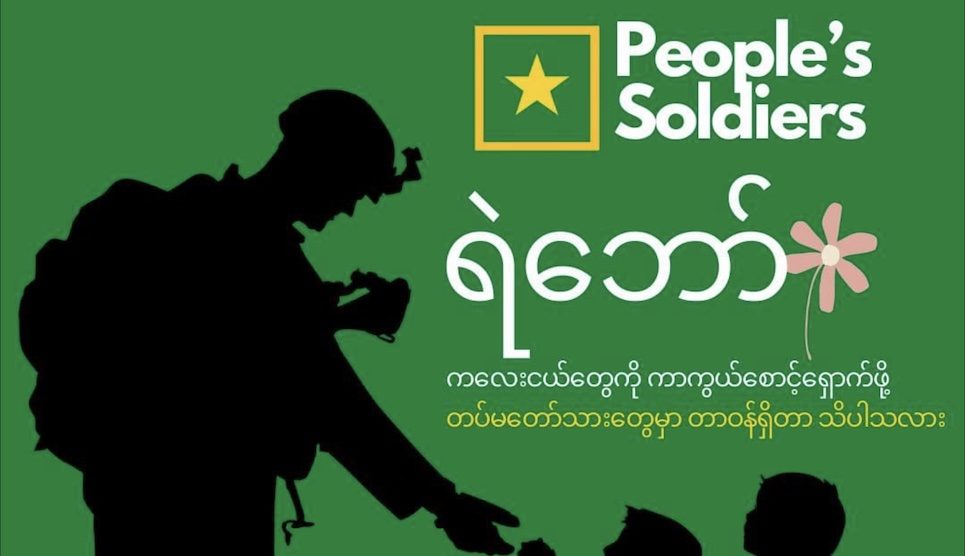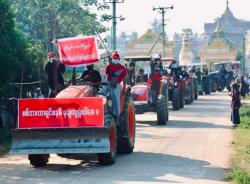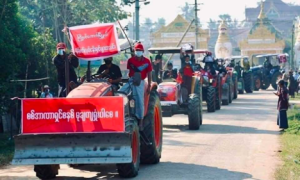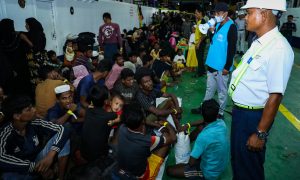Since the military coup in Myanmar in February 2021, around 4,000 soldiers and 10,000 police officers have joined the Civil Disobedience Movement (CDM), aligning themselves with the resistance to the military junta. These defectors are registered as “CDM soldiers” or “CDM police” by the National Unity Government (NUG), formed in opposition to the junta in April 2021.
In addition to these defectors who have formally signed up with the NUG, an even higher but unverified number of soldiers have deserted, and over the past six months more than 6,000 soldiers, including higher ranks and entire battalions, have surrendered as resistance forces have gained ground, especially in the border regions.
These developments contribute to a significant depopulation of the Myanmar military, reflecting low morale within its ranks due to a mixture of defeats to resistance forces, combat fatigue, appalling conditions for lower ranks and excessively violent military persecutions of civilians.
Defection, signalling the deliberate shift of “sides” from the parent organisation to the wider resistance movement—or to what Myanmar defectors call “the people’s side”—has emerged as a powerful revolutionary strategy that extends beyond mere reduction of combat personnel available to the junta.
After leaving the military, many defectors have undergone a significant personal transformation and contributed to co-producing a deeper critique of the military system, based on their first-hand insider knowledge. As Ah Lynn and I argue in a recent article published at the Journal of Contemporary Asia, through their engagement with other actors in the resistance movement, this critique has fed into wider revolutionary narratives regarding a new society and a new kind of military in Myanmar.
Only a few defectors have joined the armed resistance, but many others have devoted their time to mobilise additional defectors by helping them with escape options and appealing to soldiers’ moral disaffection with violence against civilians and their dissatisfaction with the repressive conditions inside the military, principally through various forms of online communication. Since May 2021, these activities have been galvanised by the organisation of defectors into “CDM soldier groups”—notably People’s Embrace and People’s Soldiers (now People’s Goal)—and with support from the NUG, several Ethnic Resistance Organisations (EROs) and pro-democracy activists.

A cartoon by the illustrator known as MLO. Original text: ’Soldiers are serving the country’. (the word ’country’ is crossed out with a green pen). New text: ’Soldiers are serving Aba’. Aba here refers to the Commander-in-Chief.
The rate of defections since the 2021 coup constitutes a significant blow to the Myanmar military’s historical image of strong internal cohesion. The degree to which defectors have organised themselves and joined the pro-democracy opposition is unprecedented in Myanmar’s long periods of military rule since the first coup in 1962. Although desertions among lower ranks have been common in the past, only a few defections occurred during previous popular uprisings such as in 1988 and 2007.
Drawing on its pervasive accumulation of economic and political power since 1962, the military was previously able to limit defections by instilling loyalty and cohesion through indoctrination, promotions, patronage, reshuffles, and stringent control of soldiers. Although the military has continued—and has even tried to increase—these counter-defection strategies, post-2021 coup defections reflect notable shifts, not only in the institutional loyalty to the military among lower ranks, but also in how the current resistance movement has evolved and approached the issue of defection.
Indeed it is the first time in Myanmar’s history that a resistance movement has deliberately invited soldiers and police to join it and adopted defection as a revolutionary strategy. This has been immensely important for shaping defection dynamics, but it did not happen overnight.
The possibility for defection initially relied on the opening of the broader Civil Disobedience Movement (CDM) to soldiers—along with civil servants, teachers, doctors, railway workers and many others—who refused to work under the military. This opening required a significant narrative shift from portraying departing soldiers as cowards and perpetrators of military violence to honouring them as heroes and victims of an oppressive military system.
Making room for military personnel within the resistance’s narrative was not easy. While street protesters invited barricading police officers to join the people in the early days of the anti-coup demonstrations—with the first officers crossing over on 9 February 2021—soldiers were seen by the people as the perpetrators of military violence and oppression. As evident in memoirs by soldier defectors, leaving the military was not only associated with immense safety risks for themselves and their families, but also with notions of cowardice and treason, and fears of not being welcomed by the people.
Farmers, Facebook and Myanmar’s coup
New analysis shows how a surge of online resistance in the countryside faded amid fear and self-censorship.
Shortly afterwards, two military captains, Nyi Thuta and Lin Htet Aung, went public on social media from their hideouts in non-disclosed liberated areas to proclaim that they had joined the CDM. They began intensive online campaigns to persuade others to defect and compelled people to welcome soldiers, through Facebook postings, videoclips, Telegram groups and media interviews.
As soldiers themselves, they served as exemplars of junta insiders who had the courage to leave, despite the enormous risks. Through their messages, leaving the military was conveyed as a moral and honourable act of both self-reclamation and a contribution to a collective patriotic cause. They appealed to individual soldiers’ moral disaffection with the violence against civilians, but also articulated a deeper critique of the military leadership and the internal system it sustains. Their messages began to form a narrative of defection as both a personal liberation from the repressive conditions within the military and a patriotic, revolutionary act to defeat military dictatorship.
In May 2021, the two captains consolidated their efforts with the formation of CDM soldier groups— People’s Embrace, led by Lin Htet Aung and People’s Soldier, led by Nyi Thuta) and welcomed other defectors to join. These two groups have since served as platforms for information sharing and mobilisation of logistic and material support to aid new defectors. The captains aligned themselves with members of EROs and with several civilian pro-democracy activists who helped them convey clear messages and lobby the wider resistance movement and the NUG to support defections.
These collective activities played a pivotal role in motivating more soldiers to make the very risky decision to defect. Some were also encouraged by family members to do so. But equally, soldiers’ concern about family members’ security, or their residual loyalty to the military, could also inhibit defection. Because of this, support from the CDM soldier groups was vital in facilitating the process of leaving.
The defector support groups’ lobbying of the NUG also paid off. On 23 August 2021, the NUG published an announcement establishing defection as one of its revolutionary strategies, alongside armed defence and protests. It promised to provide security and material support to defectors and their families as well as positions in a future federal democratic army. From April 2022, defectors could get cash rewards from the NUG if they defected with military equipment—a practice that the Chinland Defence Force (CDF) had already used with some success.
People’s Embrace became the implementing arm of the NUG’s CDM sub-committee handling defector issues, which began to provide CDM registration codes to defectors, based on a vetting procedure, which formalised their CDM membership and enabled them to receive monthly allowances. The main criteria for qualifying as a defector is denouncing military dictatorship, independent of party-political affiliations and of whether defectors join the armed resistance or not.

Defector Captain Htet Myat with a message in English, posted by the People’s Soldier group on its public Facebook page.
Defection has been conveyed as a strategy to win the revolution with the least bloodshed—that is, with the least fighting—by depopulating and creating disobedience within the military. For those engaged in the CDM soldier groups, the meaning attributed to “revolution” goes beyond reducing military fighting capacity to also include efforts to transform the moral and political perspectives of soldiers and to collectively counter the military’s internal propaganda. Public and covert online activities have been directed towards these aims, also encompassing efforts to convince those soldiers who remain loyal to the military to change their views as a basis for deciding to defect, often referred to as “breaking [military] brainwash”.
EROs like the CDF, the KNU, the Kachin Independence Organisation (KIO), and the Karenni National Progressive Party (KNPP)—also known as the 3KC—have provided logistical support to defectors, including food, health care, and temporary housing in camps, sometimes combined with the NUG’s monthly allowances. However, these support structures have struggled to meet demands due to an absence of international funding. Many defectors have had to eventually seek refuge in India and Thailand.
Between August 2021 and the first half of 2022 there was a high rate of defections, which can be attributed to the various activities of EROs, the NUG and the CDM soldier groups. But setbacks were experienced after that period, partly due to the military’s intensified prevention efforts. The military issued death penalties for defectors in hiding and spread messages suggesting that defectors were being killed by resistance forces.
Unfulfilled hopes of third-country asylum and frustration with inadequate support for defectors’ livelihoods and security also played a role in slowing the rate of defections in the latter half of 2022. However, during 2023, there was a surge in defections by frontline soldiers, and we also saw the first large-scale collective defection by a military-affiliated militia in Kayah State, the Karenni National People’s Liberation Front (KNPLF). Mass surrenders on the battlefield have also begun to occur, not least since Operation 1027 in northern Shan State. These dynamics owe in large part to the advancement of the resistance forces, resulting in the military losing significant bases and territorial control.
Developments since 2023 have added new dynamics and challenges to the defection movement. While early defectors primarily left the military for moral and political reasons—refusing to commit or be complicit in the violence against civilians—later defectors have been seen as motivated more by pragmatic concerns linked to combat fatigue and the fear of dying in battles with resistance forces.
This apparent shift in defectors’ motivations has sparked debate among early defectors, EROs and the NUG about the extent to which soldiers who have remained within the military for a long time after the coup should be accepted—and indeed trusted—as defectors. Discussions related to transitional justice, especially for those who have actively engaged in violent atrocities, have also infused this debate.
Overall, however, EROs, People’s Defence Forces (PDFs) and the NUG continue to welcome defectors, including by treating prisoners of war and surrenderers in accordance with international law. Collaborative efforts are also being made to develop stronger strategies for boosting defections. In 2023 and 2024, for instance, the “Defection and Defiance Movement” held online forums with the participation of defectors, ERO representatives, civil society actors, international partners and the NUG, where experiences and solutions were discussed.
A huge challenge now is the ability of resistance groups to accommodate the high numbers of surrendered soldiers and military officers, and ensure they do not return to the military. This includes possible strategies to convert surrenderers into defectors, requiring a scaling-up of vetting procedures, awareness raising campaigns, security, and material support. Such efforts require substantial resources and capacity, which is a huge challenge, given the lack of external funding.
The junta’s enactment of a compulsory conscription law in response to the erosion of military manpower is likely to further reshape defection dynamics. Conscription is causing fear and frustration among young people unwilling to join. Although it was intended by the junta to boost morale within the military, it may backfire as poorly trained young people with low or no fighting spirit and loyalty to the military could be expected to flee if given the opportunity. This could lead to an increase in defections, especially if the absorption and support capacity of the resistance organisations are boosted.
Defections in Myanmar since the military coup in 2021 reflect the dynamic and challenging character of defection processes during ongoing violent conflicts and revolutions. Although defections have not yet been effective enough in overturning military rule, it has nonetheless been an important strategy to critically challenge the Myanmar military system in ways that extend beyond mere reduction of combat personnel. International support to organisations hosting defectors could go a long way in aiding defection processes, which are not only important for the de-escalation of current military atrocities, but also for the future reformation of the military system.
 Facebook
Facebook  Twitter
Twitter  Soundcloud
Soundcloud  Youtube
Youtube  Rss
Rss 



